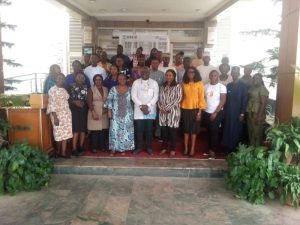
Stakeholders at the Palladiums Strengthening Civic Advocacy and Local Engagement (SCALE) project, sponsored by USAID
By Justina Auta and Angela Atabo
Palladium Nigeria, an NGO, has tasked the media and critical stakeholders on the need to eliminate Sexual and Gender-Based Violence (SGBV), and Child Early and Forced Marriage (CEFM) in the country.
The News Agency of Nigeria (NAN) reports that the stakeholders were trained in Abuja on Wednesday under Palladiums Strengthening Civic Advocacy and Local Engagement (SCALE) project, sponsored by USAID.
Other stakeholders trained were Civil Society Organisations (CSOs), Business Member Organisations (BMOs) on reporting Sexual and Gender-Based Violence (SGBV), and Child Early and Forced Marriage (CEFM).
Mr Eric Umoru, the Social Protection Adviser, Palladiums SCALE project, said the exercise aimed at encouraging more reportage, sensitisation and advocacies on policy reforms and implementation that would eliminate SGBV and CEFM cases.
Umoru said the exercise was necessitated due to the increasing cases of SGBV, child early and forced marriage, trafficking in persons and so many other forms of violence in the society.
These cases are increasing because of the spate of insecurity and poverty, which has increased the rate of abuse.
So we decided to organise this training for these critical stakeholders so that they are better aware of some of the dynamics of abuse and some of the antics that exploiters use in carrying out their
cases.
Following this improved learning, we expect participants to develop reports, media contents from a trauma informed perspective on the extent of damage, that SGBV causes on victims, he said.
Stressing the need for collaboration between key stakeholders, Umoru urged them to amplify their voices on improving policy implementation towards ending violence and harmful practices in Nigeria.
There are a lot of policies around SGBV and CFM that have not been implemented adequately.
So they need to, as active stakeholders in response, call out stakeholders to push for reforms and implementation as the case may be, he said.
Umoru also encouraged media organisations to highlight the drivers, indicators, effects and the long term effects of violence in their work.
They should be able to amplify the voices of survivors, where they are not able to speak, theyre able to call out irresponsive government attitudes and behaviour that is facilitating that.
We are localising the responses by working with local organisations, media practitioners and grassroots base structures that can help to amplify it.
So we continue to engage government for accountability and increased great response, he said.
Dr Maji Peterx, the Country Director, Equal Access International, described SGBV and CEFM as an endemic, hence the need to sensitise the public on its negative impacts in the psyche and societal structure.
Peterx, also a facilitator, said the workshop would raise consciousness around negativities in the society and create a system that was more appealing to younger people.
This is to raise awareness, reconscientise people to increase knowledge about the ills of SGBV, he said.
Ms Ene Oshaba, a gender advocate, said the training had further enlightened her on new ways of reporting SGBV, especially the need to understand issues and why people behave the way they do.
One need to be very conscious of the fact that our society is context based and that shapes our attitudes and behaviour.
As a journalist, I have a huge responsibility in changing the narratives with very impactful and issue based reporting on women and girls.
Amplifying the voices of women and girls is a key step to finding lasting solutions to their societal challenges, she said.
Mrs Maureen Okpe, a gender reporter, said: We discussed about conflict, which we always tie to negative outcome, but the training made me understand things differently as conflict in itself is neutral.
But the outcome which is determined by our response is what makes the difference.
During conflict our response is influenced by so many things by our experience, educational qualification, exposure and environment; these determines how we react to things, she said. (NAN)(www.nannews.ng)
===================
Edited by Dorcas Jonah/Muhammad Suleiman Tola
Source: NAN News